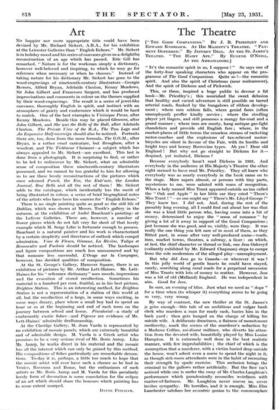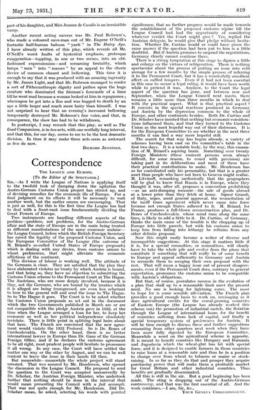The Theatre
[" THE GOOD COMPANIONS." BY J. B. PRIESTLEY AND EDWARD KNOBLOCK. AT HIS MAJESTY'S THEATRE. " PAY.. MENT DEFERRED." By JEFFREY DELL. AT THE ST. JAMES'S THEATRE. " THE HAIRY APE." By EUGENE O'NEILL.
AT THE AMBASSADORS.]
" IT'S the romantic spirit in us, I suppose ! " So says one of the forty-four speaking characters who appear on the pro- gramme of The Good Companions. Quite so !—the romantic spirit. And also the spirit of Christmas (near midsummer). And the spirit of Dickens and of Pickwick.
This, or these, inspired a huge public to devour a fat book—Mr. Priestley's ; this nourished the sweet delusion that healthy and varied adventure is still possible on tarred arterial roads, flanked by the bungalows of ribbon develop- ment ; where rain seldom falls, where genial faces (often unemployed) proffer kindly service ; where the strolling player yet lingers, and still possesses a mangy fur-coat and a grand manner ; where inns are musty, hang antique gas-light chandeliers and provide old FInglish fare ; where; in the market-places of little towns the ceaseless stream of racketing motor-coaches and the explosions of tax-relieved motor- bicycles are silent in favour of the Fair, with its booths and bright toys and horsey Borrovian types. Ah yes ! Dear old England ! But why not go straight to Dickens for it— despised, yet imitated, Dickens ?
Because everybody hasn't read Dickens in 1931. And everybody in the audience at His Majesty's Theatre the other night seemed to have read Mr. Priestley. They all knew who everybody was as nearly everybody in the book came on to the stage. Mere supers almost, or persons with tiny parts, mysterious to me, were saluted with roars of recognition. When a lady named Miss Trent appeared outside an inn called the " Oak and Apple " in her little car they cried. " There's Miss Trant ! "—as one might say " There's Mr. Lloyd George !" They knew her. I did not. And, during the rest of the passably long evening, all I could find out about her was that she was a kind little person who, having come into a bit of money, determined to enjoy the " sense of romance " by giving a lot of it away in support of the Good Companions ; just because she was good, and so, visibly, were they. It was really the one thing you felt sure of in most of them, as they flitted past, in scene after very well-produced sceneroads, inns, market towns, theatres, a subway, a liner : on which, at last, the chief character or thread or link, one Jess Oakroyd (valiantly exhibited by Mr. Edward Chapman) steps to escape from the sole modernism of the alleged play—unemployment.
But why did Jess go to Canada—or wherever it was ? In this jolly world of gentle hearts he could have stayed, surely, searching along rural roads for a perpetual succession of Miss Trants with lots of money to scatter. However, Jess was a bit of old (Midland) England. He was independent in aim. Good for Jess.
In sum, an evening of bliss. Just what we need as " dope " for a time when (to whisper it) everything seems to be going so very, very wrong.
By way of contrast, the new thriller at the St. James's is grim enough—this tale of an ambitious and vulgar bank clerk who murders a man for ready cash, buries him in the back yard ; then gets hanged on the charge of killing his suicide wife. A deliberate dreariness, a flatness of monotonous mediocrity, mark the scenes of the murderer's seduction by a Madame Collins, soi-disant milliner, who diverts his atten- tion from the devoted wife, beautifully played by Miss Louise Hampton. It is extremely well done in the best realistic manner, with few improbabilities ; the chief of which is the assumption that a murderer, with a victim buried deep outside the house, won't admit even a nurse to spend the night in it, as though sick-room attendants were in the habit of recreating their strength by spade exercise. This seclusion brings the criminal to the gallows rather artificially. But the flaw isn't noticed while one is under the sway of Mr. Charles Laughton's performance which paradoxically reconciles weirdness with matter-of-factness. Mr. Laughton never moves us, never invites sympathy. He horrifies, and it is enough. Miss -Elsa Lanchester subdues her eccentric genius to the commonplace
part of his daughter, and Miss Jeanne de Casalis is an irresistible vamp.
Another recent acting success was Mr. Paul Robeson's, who made a coloured cave-man out of Mr. Eugene O'Neill's fantastic half-human baboon " yank " in The Hairy Ape. I have already written of this play, which reveals all Mr. O'Neill's worst faults of hysterical emphasis, grotesque exaggeration—toppling, in one or two scenes, into an old- fashioned expressionism—and screaming brutality, which lumps " men " into " masses " by an appeal to the chorie device of common chaunt and bellowing. This time it is enough to say that it was produced with an amazing ingenuity by Mr. James Light, and that Mr. Robeson managed to confer a sort of Pithecanthropic dignity and pathos upon the huge creature who dominated the fireman's forecastle of a liner till he went mad because a woman looked at him in repugnance ; whereupon he got into a Zoo and was hugged to death by an ape a little larger and much more hairy than himself. I was not surprised to hear that an evening's incessant bellowing temporarily destroyed Mr. Robeson's fine voice, and that, in consequence, the show has had to be withdrawn.
In postscript, I may remark that this play, as well as The Good Companions, is in two acts, with one restfully long interval, and that this, for our day, seems to me to be the best dramatic division. In time it may make three acts seem as awkward as five do now.
RICHARD JENNINGS.







































 Previous page
Previous page